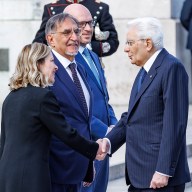 George Maier enjoys a smoke on on Boston Common.
George Maier enjoys a smoke on on Boston Common.
PHOTO BY NICOLAUS CZARNECKI/METRO
Two weeks ago the city made it illegal for anyone to smoke tobacco, marijuana and vaporized substances in its 251 parks, squares, cemeteries and beaches, but questions linger as to how the city plans on keeping people from publicly puffing, and whether the ban is even warranted.
The prohibition aims to reduce the threat of second hand smoke inhalation and cigarette litter, and also strives dissuade young people from picking up the habit, according to the Boston Public Health Commission.
“This newest smoking ban builds on some of the work we’ve done around tobacco control in general. We want green space to be as healthy and inviting as possible,” said Nick Martin, a health commission spokesman.
Anyone who doesn’t comply risks a fine of $250. But for the next few months, those caught lighting up may not have to dip into their cigarette funds, as patrolmen will likely hold off on issuing tickets.
“If (officers) see someone smoking, they will verbally urge that person to comply and explain why we have the ban in place,” said Jacquelyn Goddard, spokeswoman for the Parks Department of Boston. “They will not be issuing the fines until a public education campaign is done. Even after the campaign, they will approach the smokers to give a warning.”
And what about the Freedom Rally, a famously smoke-friendly gathering in the city-controlled Boston Common?
When asked what impact the ban would have on attendees of the annual event, which promotes the legalization of marijuana, Goddard said, “No group would be exempt from the policy.”
Bill Downing, of rally organizer MassCann/NORML, said the ban will not interfere with the group’s plan to hold this summer’s event.
“We’re not going to walk away… Come on this is the Freedom Rally, man. We’re going to have a freedom rally. I think what’s going to happen is what has happened in the past; (Boston Police) are going to walk in, and try to write a whole bunch of tickets,” he said, adding that many affiliated with the rally hoped Boston Police would ease up after the decriminalization of marijuana.
“We were hoping that the police would kind of be cool, but I guess that’s not in their nature,” Downing said.
The rally issue aside, Downing believes the ban in general is “ridiculous.”
“If you’re smoking in a park, the chances of someone having lung problems from secondary smoke, I’d be willing to bet, are zero,” said Downing, adding the disclaimer, “I’m not a f—ing scientist. I’m just a logical human being.”
Michael B. Siegel, a professor of community health sciences at the Boston University School of Public Health, for the most part, agrees.
“Undeniably non smokers have the right to not have to be exposed to significant health hazards that they don’t have control over,” said Siegel.
“However, I think that banning smoking in these wide-open places doesn’t make a lot of sense. It really goes beyond the health justification… I’m not aware of any data that shows that fleeting exposure to smoke in a park represents a significant health hazard, or poses a public health problem.”
About the ban:
- Initially proposed by former Mayor Thomas M. Menino, the ban was approved and went into effect on Dec. 30 .
- The ban isn’t just for cigarettes. It prohibits the smoking of tobacco, marijuana or any other material including vaporized substances on 251 properties.
- Those who challenge the new rule are risking a fine of $250.
Follow Morgan Rousseau on Twitter: @MetroMorgan
Follow Metro Boston on Twitter: @MetroBOS
















